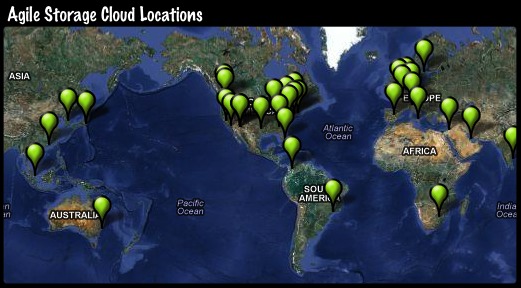Agile Command Line Utilities
Project description
AgileCLU is a command line tool implementation and Python programming library for Limelight Networks Agile Storage cloud platform. It leverages Agile’s JSON-RPC APIs and HTTP ingest and egress capabilities in an easy to use way.
Communication
Feel free to send any questions, comments, or patches to my Github page (you’ll need to join to send a message): https://github.com/wylieswanson/AgileCLU
Basic Installation
If you already have Python and [Python Package Index](http://pypi.python.org/pypi/setuptools) (PyPI) installed on your machine, the installation of AgileCLU is simple and straightfoward. Simply execute one of the following commands (sudo is usually required on Linux):
easy_install AgileCLU
or,
pip install AgileCLU
If the above method worked for you, you can skip the next operating system-specific installation notes and move on to Configuration, as you have now completed the installation of AgileCLU. If not, consult the relevant operating system-specific section that follows.
Commands
The commands that are currently available are:
agileprofile - Generate a profile based on account credentials and ingest/egress information
agilefetch - Automatically download a file from any URL and place it in your storage in a specified directory
agilemkdir - Make a directory
agilerm - Remove a file
agilels - List a directory
agilepost - Upload a file
NOTE: For Windows, add a “.py” extension to the above commands.
Installation:Linux
On most Linux distributions, Python is already installed, you only need to install PyPI. For Debian, Ubuntu and other distributions using APT, install PyPI with the following:
sudo apt-get install python-pip
If you are running another distribution, consult the [Python setuptools](http://pypi.python.org/pypi/setuptools) documentation. After you complete this step, complete Basic Installation and move on to Configuration.
Installation:Mac OSX
Python is already installed by default on modern OS X.
Installation:Windows 32-bit and 64-bit
Python must be installed on the machine. You can download from http://www.python.org/getit/ or, specifically, for Windows 32 and 64-bit:
- Python 2.7.3 Windows Installer (Windows binary - does not include source)
- Python 2.7.3 Windows X86-64 Installer (Windows AMD64 / Intel 64 / X86-64 bainry - does not include source)
Once Python has been installed, you will want to add setuptools, the mainstream package manager for Python, also known as PyPI.
Next, set the system’s PATH variable to include directories that include Python components and packages we’ll add later. To do this:
Click the bottom left Windows icon
In the search field, type ‘system’
In the Control Panel section of the search results, select “Edit system environment variables”
Select “Environment Variables”
In the “System variables” section, scroll down to Path and click “Edit…”, and then append “;C:Python27;C:Python27Libsite-packages;C:Python27Scripts;” to the “Variable Value”, then select OK.
- For 32-bit version of Python
- Install setuptools using the provided .exe installer.
- For 64-bit versions of Python
- Download ez_setup.py and run it; it will download the appropriate .egg file and install it for you. (Currently, the provided .exe installer does not support 64-bit versions of Python for Windows, due to a distutils installer compatibility issue.
Run “ez_setup.py”
easy_install AgileCLU
Upgrading
If you are upgrading from a release prior to 0.3.1, you may need to manually delete the files from your Python installation (egg and easy-install.pth) prior to invoking easy_install or pip. For future upgrades, can force to latest version with:
easy_install -U AgileCLU
Configuration
After installing AgileCLU, run use the profile tool to generate the proper output to place in an /etc/agile/agile.conf configuration file. You can create as many configuration profiles as you like, specifying to use them over the default agile.conf profile by specifying the -l option on any given command.
agileprofile
Example output:
agileprofile (AgileCLU 0.3.6)
This tool generates Agile Storage profile text to be pasted into AgileCLU profile configuration files (eg. /etc/agile/agile.conf is the default). The information should have been provided to you by Limelight Networks, often via a “welcome letter”. If you have questions regarding the account information, please contact support@llnw.com.
Enter Agile username: testcompany Enter Agile password: Re-enter Agile password: Enter your egress hostname: global.mt.lldns.net Enter your egress base path: /testcompany Enter your ingest hostname: api.agile.lldns.net
PASTE THE FOLLOWING IN YOUR PROFILE CONFIGURATION FILE
[Identity] username = testcompany password = A4UsWnRpKOdNy0HNWDHY+Q==
[Egress] protocol = http hostname = global.mt.lldns.net basepath = /testcompany
[Ingest] protocol = https hostname = api.agile.lldns.net
[Logging] enabled = no logfile = /var/log/agileclu.log level = info
Requirements
This package has the following requirements:
An account on Limelight Network’s Agile Storage cloud platform. (http://www.limelightnetworks.com)
poster by Chris AtLee - used for streaming ingest (http://atlee.ca/software/poster/)
progressbar by Nilton Volpato - used for console ingest progress bar (http://code.google.com/p/python-progressbar/)
pydes by Todd Whiteman - used as part of the password encryption scheme for config files (http://twhiteman.netfirms.com/des.html)
jsonrpclib by John Marshall - an implementation of the JSON-RPC specification (https://github.com/joshmarshall/jsonrpclib)
Storage Locations
As of October 2012, the Agile Storage Cloud has storage capacity in 34 geographies around the world.

Project details
Release history Release notifications | RSS feed
Download files
Download the file for your platform. If you're not sure which to choose, learn more about installing packages.











